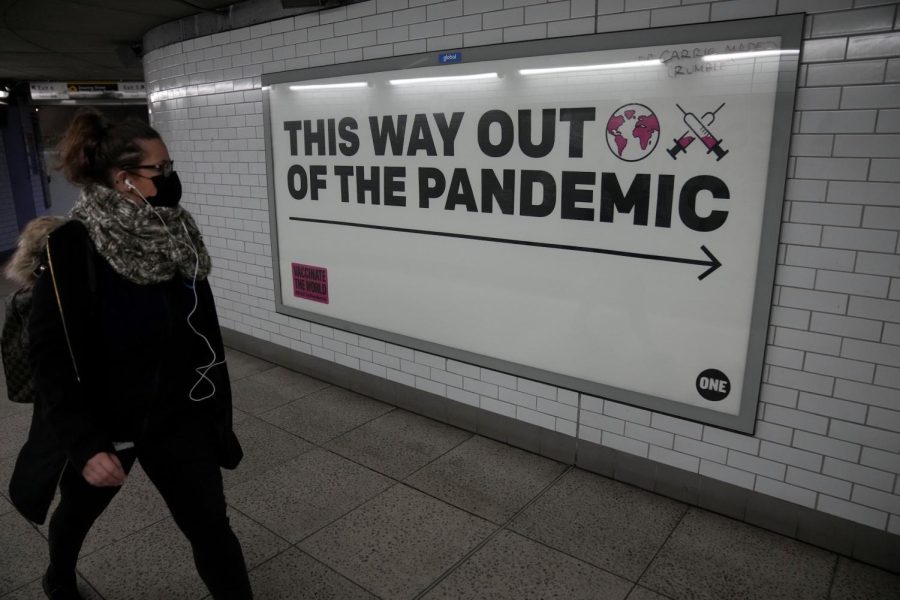Are we positive about COVID-19?
A woman walks by a health poster while walking to London’s Westminster underground train station in England.
October 3, 2022
During his appearance on “60 Minutes,” President Biden announced that “the pandemic is over,” which has sparked controversy among experts, politicians, and the general public alike. On one hand, his comment appears to ring true for many of us – it seems we are getting to the point where the majority of Americans feel comfortable resuming their lives after a worldwide halt. On the other hand, according to the CDC, nearly 400 Americans are still dying daily, so clearly, the pandemic has not ended for everyone.
However, beginning to feel safer again and believing the worst of COVID is behind us is not necessarily wrong. According to Biden’s health secretary, Xavier Becerra, the president was simply “reflecting what so many Americans are feeling and thinking; that COVID has disrupted our lives for so long, but we’re also finding that with these effective vaccines, with masking, with the efforts to protect our children, seniors, we are learning how to cope with this virus.”
Nonetheless, Becerra went on to reiterate that “people are still dying.” Furthermore, there is an important distinction to be made between our feelings and opinions on the state of the pandemic and a presidential statement. What Biden announces on national TV can affect public perception and policy – it can harm the efforts that are being put forward to reduce the negative impacts of COVID.
Currently, Biden and his administration are attempting to secure an additional 22.4 billion in emergency COVID funding from Congress. The funding will be allocated to testing, further research, and most notably, vaccinations. As stated by Jennifer Nuzzo, Director of the Center for Pandemic Preparedness and Response at the Brown University School of Public Health, and other public health experts, as we roll into fall and winter and people begin socializing indoors and traveling for the holidays, COVID will likely experience another surge, which means that vaccinations are vital in preventing more people from getting sick and dying.
Currently, the CDC reports that only 68% of Americans have completed their original vaccine course, and less than half of those individuals have received boosters.
According to NPR, Biden’s administration is trying to persuade Americans to get newly authorized “bivalent” booster shots designed to combat omicron subvariants to prepare them for the upcoming surge, and Biden’s comment only hinders their efforts.
As Dr. Celine Gounder, epidemiologist and senior fellow of the Kaiser Family Foundation states, “When you have the president of the U.S. saying the pandemic is over, why would people line up for boosters?”
To secure the funding, Republican support in the Senate is required. Biden’s words are already being used by Republicans in order to question the vaccine and mask mandates that are still in place for federally-funded programs such as Head Start and the vaccine requirements for the military. In Congress, the funding has struggled to get approved due to GOP lawmakers arguing that there is still unspent money from prior COVID funding that can be used, and a public statement from the President that the pandemic is over is not helping matters.
Additionally, the reason for student loan repayment legislation and Medicaid’s COVID provision will end if the pandemic is truly over. According to the Assistant Secretary for Planning and Evaluation (ASPE) Office of Health Policy issue brief from August 2022, Medicaid’s COVID provision – which provides insurance for about 15 million people – will end after the “expiration of the COVID-19 public health emergency.”
While Biden’s administration recently stated that the public health emergency, which gives the government the flexibility to make these healthcare provisions, is still in effect, announcing that the pandemic is over might call for an end to these modifications soon. According to Reuters, the US Department of Health and Human Services is expected to let the public health emergency expire in January 2023, which would leave 15 million individuals without healthcare.
It is important to recognize that Biden does not even have the authority to declare a pandemic over – that power belongs to the World Health Organization, which is part of the United Nations, and its director, Dr. Tedros Adhanom Ghebreyesus. The organization declared the coronavirus public health emergency as a pandemic in 2020, and in terms of the end of this pandemic, Dr. Ghebreyesus has stated that, “We are not there yet, but the end is in sight.”
The end of a pandemic that has dominated our lives since 2020 is understandably desirable, but it is important for all of us, including Biden, to remember that while we have made great strides in regards to living with and moving on from this disease, we are not out of the woods yet.





















